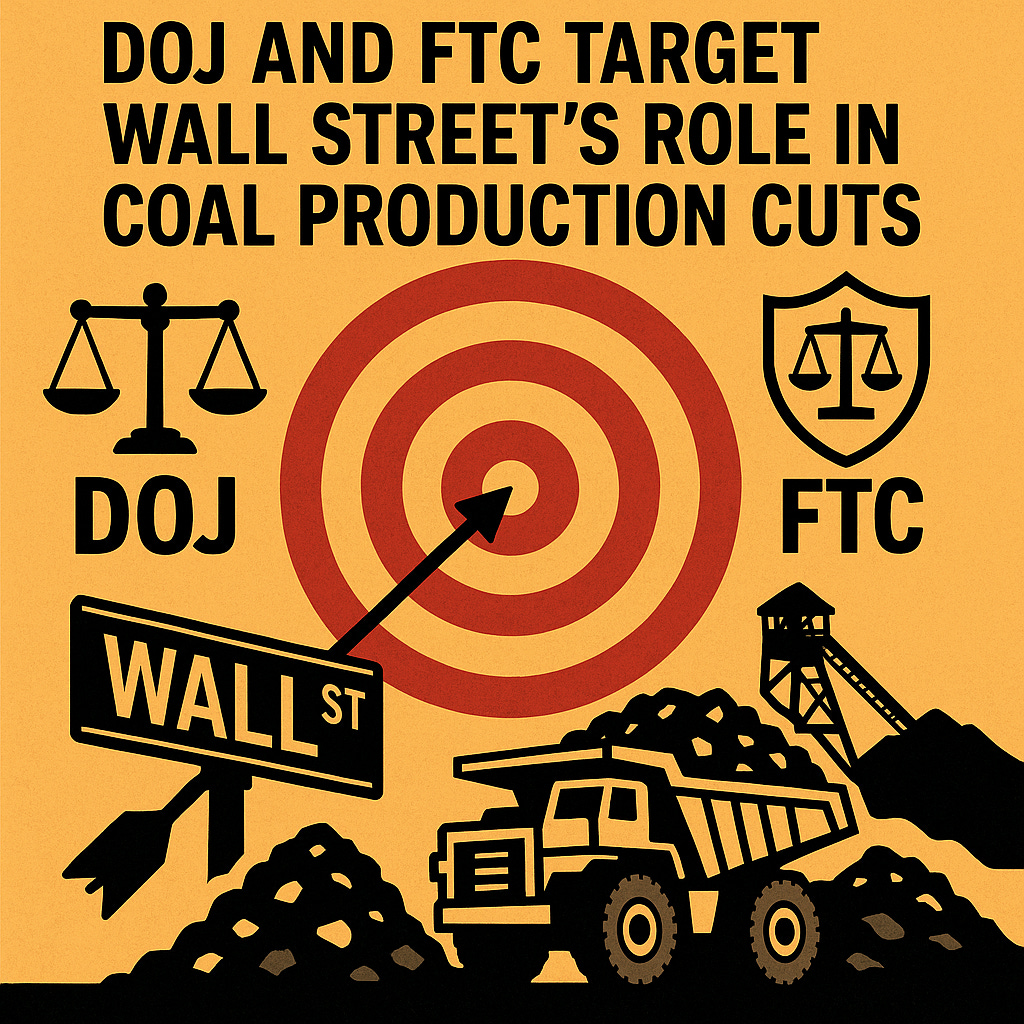DOJ and FTC Target Wall Street’s Role in Coal Production Cuts
What It Means for Consumers and Energy Policy
Musical Rendition of this story: Coal Country Showdown
The Justice Department (DOJ) and Federal Trade Commission (FTC) have taken a historic step to protect competition in America’s energy markets. On May 22, 2025, the agencies filed a statement of interest in the lawsuit Texas et al. v. BlackRock, Inc., marking the first time federal enforcers have formally addressed the antitrust risks of common shareholding—when financial giants hold stakes in multiple competing companies—as it relates to U.S. coal production.
The Allegations: Wall Street, Coal, and Competition
The lawsuit, led by the Texas Attorney General, alleges that BlackRock, State Street, and Vanguard—three of the world’s largest asset managers—used their influence as major shareholders in rival coal companies to encourage those firms to reduce coal output. The complaint claims this coordinated reduction drove up energy prices for American consumers.
This isn’t just a technical legal battle. It’s a flashpoint in the national debate over energy policy, financial sector power, and America’s economic and environmental priorities.
Backdrop: The Biden-Trump Energy Policy See-Saw
While the DOJ’s statement comes under President Trump’s administration, the context is shaped by two recent executive orders:
Executive Order 14156 (Jan. 29, 2025): Declared a national energy emergency, emphasizing the need to secure and expand domestic energy resources.
Executive Order 14261 (April 8, 2025): Explicitly called for an increase in domestic energy production, including coal—a sharp pivot from previous efforts to transition away from fossil fuels.
These orders reflect a shift back toward “energy dominance,” prioritizing coal as a strategic resource. The DOJ and FTC argue their antitrust action supports these executive orders by ensuring that markets—not powerful asset managers—determine coal output.
What Are Common Shareholdings, and Why Do They Matter?
Common shareholding occurs when an investor—often a large asset manager—owns stakes in multiple companies within the same industry. This is common due to the popularity of index funds and ETFs.
Potential Problem
If a single shareholder has significant voting power in several competing coal companies, it could use that influence to encourage all companies to reduce production, boosting prices and profits industry-wide. This harms consumers by driving up energy costs.
Antitrust Law and Safe Harbors
Historically, passive investment by asset managers has been protected under antitrust laws. The DOJ’s statement clarifies that while most index fund investing is legal, using common ownership to influence market-wide output is not protected and could violate antitrust statutes.
The Stakes: For Consumers and Markets
“American consumers suffer when institutional asset managers use shareholdings in competing companies to orchestrate output reductions… We will not hesitate to stand up against powerful financial firms that use Americans’ retirement savings to harm competition under the guise of ESG.”
— Assistant Attorney General Abigail A. Slater
This is a direct challenge not just to the asset managers, but to the broader practice of using Environmental, Social, and Governance (ESG) strategies to push companies toward lower fossil fuel production. The DOJ’s position is that even well-intentioned social goals do not excuse illegal market manipulation.
The Broader Context: Data and Industry Trends
Coal’s Role: The U.S. still generates about 20% of its electricity from coal (EIA, 2024), though the trend has been downward due to cheaper renewables and natural gas.
Asset Manager Power: BlackRock, State Street, and Vanguard collectively manage over $20 trillion in assets and are often the largest shareholders in S&P 500 companies—including energy firms.
Energy Prices: U.S. electricity prices have risen in recent years, partly due to supply constraints in coal and natural gas markets. The DOJ claims anti-competitive behavior may be one cause.
Antitrust Enforcement: The DOJ and FTC have ramped up scrutiny of financial sector influence in “real economy” industries, breaking new legal ground with this case.
Implications: Why This Matters
For Consumers: If the allegations are true, coordinated reductions in coal output could mean higher energy bills for millions of Americans—especially in regions still dependent on coal-fired power plants.
For Markets: This case could set a precedent for how antitrust law treats common ownership—not just in energy, but across industries from airlines to healthcare.
For Policy: The case puts the spotlight on ESG investing. If the courts side with the DOJ, asset managers may need to rethink how they balance social goals with legal risks.
For the Future of Energy: The outcome could influence how quickly (or slowly) the U.S. moves away from coal, depending on how much leeway asset managers have to steer company behavior.
What’s Next
The DOJ and FTC’s intervention signals a willingness to challenge Wall Street’s role in shaping critical industries. The case will unfold in federal court, but the implications will be felt nationwide—by consumers, investors, and policymakers alike.
Stay tuned. The future of America’s energy—and who gets to shape it—is at stake.
Sources:
U.S. Energy Information Administration (EIA)
Executive Orders 14156 & 14261



Interestingly, coal is also needed in the manufacturing of steel, many really rural farmers still use coal furnaces AND placing small chunks of porous coal into one's garden not only gives the soil top notch nitrogen, it also houses all the good soil critters necessary for soil, not dirt. Water that garden with green algae water (rain barrel, dug out) and ya got yourself a living thriving base soil.
Hard to tell why [they] don't want coal in everyday use.
Tis baffling.
Great article Alex.